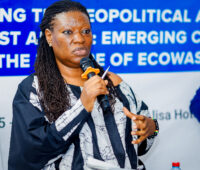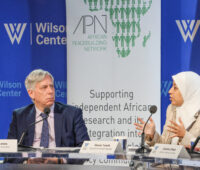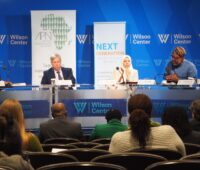In the run-up of activities leading up to the 50th anniversary of the Economic Community of West African States (ECOWAS), the West Africa Network for Peacebuilding (WANEP), the Social Science Research Council (SSRC), and the Conflict Research Network (CORN) – West Africa, organised a high-level policy dialogue from 15-16 April in Accra, Ghana, on “Understanding […]
Essays
Essays present critical analysis and debate on a pressing issue in African peacebuilding.
Communities of Practice as a Transformative Strategy for Digital Peacebuilding in Africa
by Dr. Sokfa JohnBackground As digital technologies continue to reshape the global peacebuilding landscape, new possibilities and challenges keep emerging. Some limitations relate to epistemic injustices and blindness toward local perspectives and experiences, partly due to a universalist assumption that technologies function uniformly across contexts.1 During my African Peacebuilding Network (APN) Individual Research Fellowship (2023/2024), I explored the […]
The Dynamics of Conducting Field-based Research within Religious Spaces in South Africa: Challenges and Opportunities
by Bambo MitiIntroduction This article is based on my experience conducting field research among African Pentecostal churches in the city of Johannesburg, South Africa. My research project involved conducting interviews and examining liturgical practices for the purpose of identifying processes of reconciliation in these churches. It also investigated how such practices could complement socio-political ideologies that were […]
Aborted Democratic Peacebuilding in Sudan: A Tale of Western Apathy, Regional Encroachments, and Domestic Disillusionment
by Rawia TawfikThe views expressed here emanated from a panel discussion on “Trendlines and Transformations in African Democratic Governance: Lessons for US-Africa Relations,” held at the Woodrow Wilson International Centre for Scholars in Washington DC., on November 13, 2024. In December 2018, Sudan witnessed the third democratic uprising in its post-independent history. Led by a broad coalition […]
Is US-Africa Relations at the Crossroads: What does it mean for Africa?
by Charles UkejeThe views expressed here emanated from a panel discussion on “Trendlines and Transformations in African Democratic Governance: Lessons for US-Africa Relations,” held at the Woodrow Wilson International Centre for Scholars in Washington DC., on November 13, 2024. Introduction The world is undergoing momentous geopolitical transitions as the major powers, along with a growing number of […]
Is Religion Always Violent? Understanding Religious Peacebuilding, with a Focus on the Catholic Church
by Efetobor Stephanie EffevottuIntroduction Is God violent? Would the world be better off without religion, or can religion be a force for peace? In countries like Nigeria, where religion and religious actors are often associated with violence, can they also play a vital role in peacebuilding? This article addresses those pertinent questions by building on my doctoral research […]
Analyzing Approaches to Governing Diversity: Insights from the Political Manifestoes of Ghana’s Political Parties
by Ernest BagsonIntroduction One of the formidable challenges facing Ghana as it approaches the 2024 general elections is how the country can effectively manage its diversity against the backdrop of declining trust in state institutions, growing ethno-religious tensions, economic crisis, proliferation of illicit weapons and small arms, and inter-ethnic and inter-community conflicts.[i] Additionally, the resurgence of vigilantism, […]
Transitional Justice, Conflict Prevention, and Violence in Post-War Sierra Leone: Gaps and Opportunities
by Ibrahim Bangura and Petra NederkoornIntroduction The year 2024 marks two decades since the publication of the final report of the “Truth and Reconciliation Commission in Sierra Leone” (TRCSL). The report attempted to provide an antidote to future conflicts after reviewing evidence of the causes and nature of the Sierra Leonean Civil War (1991–2002). However, the events leading to, and […]
The Economy of Mobility and Irregular Migration in South Africa’s Limpopo Province
by Samuel Kehinde OkunadeINTRODUCTION Irregular migration in the Southern African region, particularly in the Limpopo Province between South Africa, Zimbabwe, and Botswana, has assumed the dimension of a whole market economy that affects the entire population of settlements in both countries. The economy of irregular migration marks just one of the several issues and dynamics in the region. […]
The Notion of the “Veil of Ignorance” in Uganda’s 1995 Constitutional Reforms
by Nixon WamamelaIntroduction Since John Rawls’ publication of “A Theory of Justice,” the notion of the “veil of ignorance” remains relevant to law-making since it has the potential to promote impartiality and justice.1 Since 1962, Uganda has adopted four constitutions: in 1962, 1966, 1967, and 1995. These constitutions have included several provisions and reforms such as the […]











